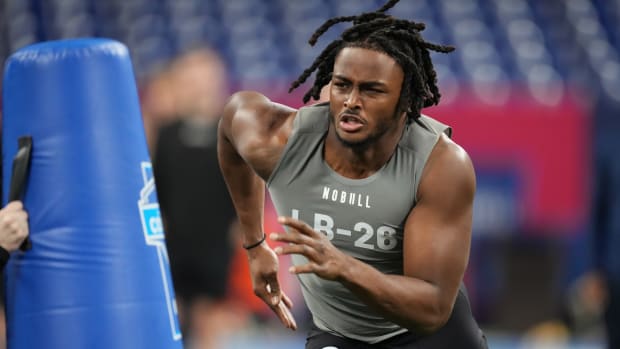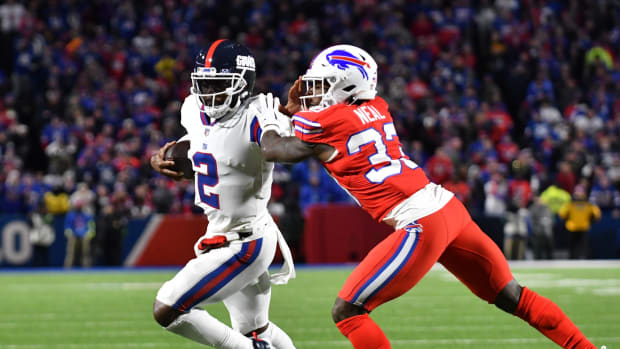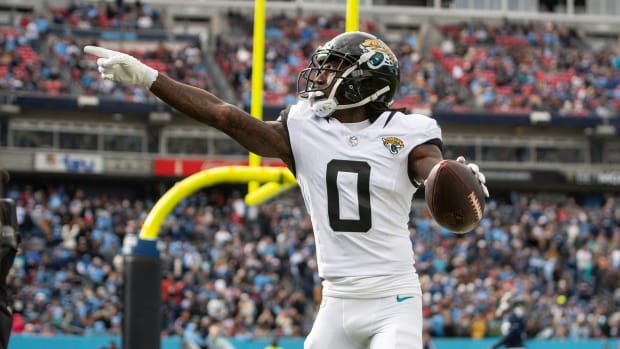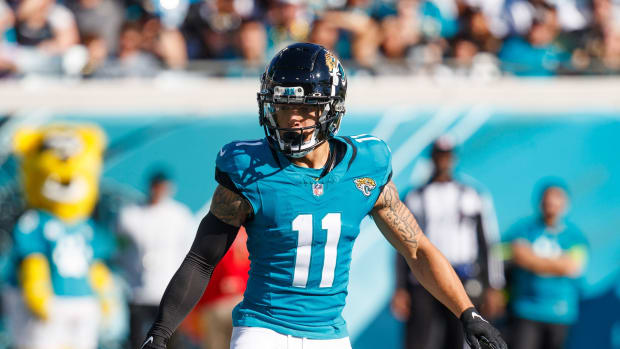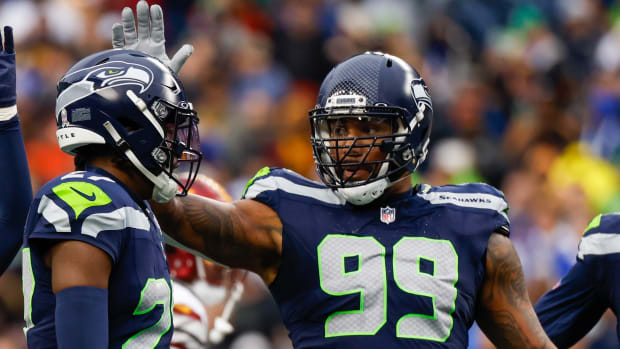Joe Cullen and the NFL’s Most Unusual Comeback Story
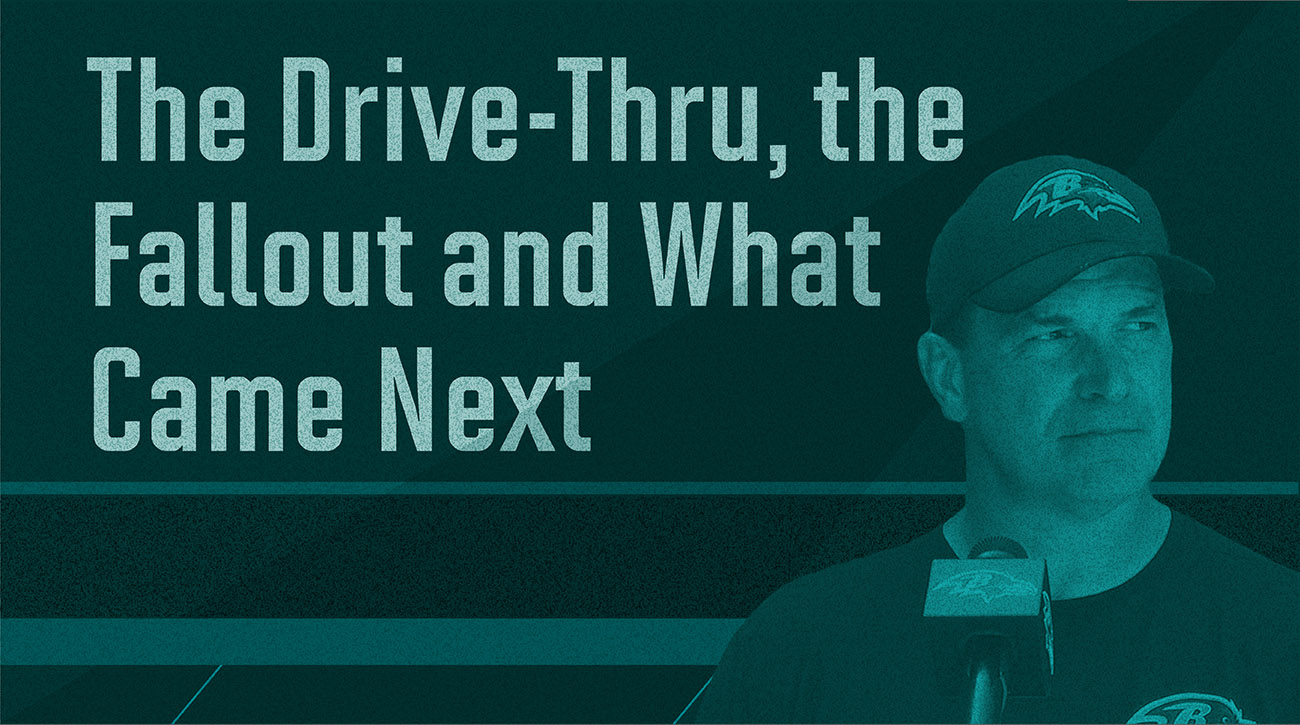
Joe Cullen awoke in the driver’s seat of his SUV, blue and red lights bouncing off his rearview mirror. He had no idea how he got there. The last thing he remembered was drinking whiskey with a few colleagues at a bar earlier that afternoon. It was Friday. The 2006 NFL regular season was two weeks away and the Lions’ coaching staff had been let out early.
As Cullen waited for officers to approach, something dawned on him: He was naked. He scurried to grab clothes from his gym bag in the backseat. Still hazy from drink and sleep, he started on the wrong end, putting on his shirt first. “The shorts, I couldn’t find them in time,” he explains now. Officers helped the now-half-naked Cullen out of his car and found a blanket to cover him. They let him search his bag, where he eventually found his shorts. As soon as those were on, he was cuffed.
Gradually, the picture became clearer. Cullen realized he was in the parking lot of the Wendy’s near his new condo, which was yet to be furnished. He’d failed to pair food with the evening’s whiskey. After going home to his apartment—and at some point after he had gotten undressed—he realized he was starving. Neglecting to put his clothes back on, he got in his car to hit the all-night drive-thru. Cullen never remembered what he ordered that night, though the Wendy’s staffers who called the police did. A single combo: burgers, fries and a drink.
“I don’t know how I didn’t get in an accident,” Cullen says. “Thank God I didn’t hurt anybody.”
Cullen had spent 16 years in the college ranks before joining Rod Marinelli’s initial Lions staff. When his calamitous three-season run in Detroit was over, it seemed it might be Cullen’s only shot in the NFL. Yet, all these years later, he’s sober, he’s in the league, and he’s one of the most respected position coaches in football—an unlikely rise that was set up by a humiliating fall.
Matt Millen’s phone rang in the middle of the night. At that point, six seasons into his run as the Lions’ team president and CEO, he knew what that meant. “Player or coach?” he answered. “Coach,” said the caller from the Dearborn, Mich., Police Department. The details of the report were read to him as a dumbfounded Millen sat silent. “I was like, ‘What the—how dumb can you be?’” he says.
Millen had hired Marinelli as his head coach the previous January, Marinelli’s first head-coaching job. He and Cullen were particularly close in coaching circles, Cullen typically visiting the veteran coach multiple times a year. Marinelli brought him on as defensive line coach.
Now, the new head coach and the embattled GM, along with the rest of the Lions brass, had to figure out what to do with Cullen. “I hadn’t even coached my first game yet and he put me in a horrible position,” says Marinelli. “You got to thinking, ‘Is it just alcohol? What the heck is going on here? Driving around naked?’”
“Your mind goes all over the place,” says Millen. “‘Oh great, do we have some freakin’ weird guy?’ My brother is a sex crimes detective, and so he gave me some stuff to ask Joe. And he said, ‘It’s important how he responds.’ So I asked Joe the questions you should never ask a guy. I mean, it was brutal. I asked him every weird, goofy thing I could think of. And his responses, they were classic. I’d ask him, ‘Joe, do you do this?’ And he’d look at me like, ‘No, what’s wrong with you? What do you think I am?’
“When I told my brother how Joe responded, he said, ‘If he was disgusted that you asked him that question, that’s good. You can’t fake that. If somebody says, ‘Well, no…’ and then they try to be real rational about it, or if they try to think it through and talk it through, he said then you better keep asking more questions. When I told him how Joe responded, he said, ‘That’s good. Believe him.’”
The team was lucky: The embarrassing arrest went unnoticed by media. But a week later, Marinelli was in his office when Cullen knocked gently and came in. “He said, ‘Hey coach, you’re not gonna believe this,’” as Marinelli tells it, “I said, ‘What? Did you get drunk again or something?’ I was teasing. Then Joe said, ‘Yeah, I got pulled over and arrested.’ I said, ‘Oh, you gotta be kidding me.’”
Cullen had been pulled over for leaving a gas station with his headlights off. Police discovered his blood alcohol level was .12 (Michigan’s legal limit is .08).
The Greatest Player Who Never Was
Marinelli made Cullen phone his mother. “I called her from my office, with Rod standing right there,” Cullen says. The second arrest caught the media’s attention, and the Wendy’s report surfaced soon after.
“It exploded on the scene,” says Marinelli. “After the second time and knowing what type of guy Joe was, I knew it was more of a disease.”
The team brass met again and, as Millen says, “the first reaction from most of the people—and I’ll say ‘most,’ because it wasn’t mine and it wasn’t [owner William Clay] Ford’s—was, ‘Get rid of him, fire him.’ And my reaction was, ‘No he’s a good man and a good coach. There’s something to save there.’”
Millen told Ford all the details of the Wendy’s arrest, “and [Ford] said, ‘Who hasn’t done that?’ He had a great sense of humor,” Millen recalls. The conversation quickly turned serious. Ford asked, “Is he worth saving?” Millen’s response: “Yeah, he is.”
“Alright, go ahead,” Ford told Millen. “But it’s not gonna be easy for him.”
“The publicity on him, the humiliation, it was brutal,” says Marinelli. “He’s on TV, they’re making fun of him, every place we went. It was tough. He showed some real grit. He just hung in there and fought through it.”
The Lions suspended Cullen for the season opener and he entered an alcohol treatment program. “That’s when you learn about the disease,” says Cullen.
Cullen had been in trouble once prior to the Lions; in 2005 he was fired from the University of Mississippi—shortly after he was hired—following an arrest on an alcohol-related charge after he passed out in a Subway restaurant.
“I didn’t drink often—I’d go months without drinking—but when I did drink, there were certain times I couldn’t stop,” Cullen says now. Those times were often when he was with “the guys.” After that second arrest in 2006, Cullen came to a realization: “Alcohol and I can’t be teammates anymore.
“[Alcoholism] gets worse in time, not better. And when I got diagnosed, they said ‘You aren’t an alcoholic, but you have alcoholic conditions and tendencies that could deteriorate in time if you don’t get on the right path.”
Neither of Cullen’s parents had been big drinkers, however Cullen’s grandfather was an alcoholic, “but he quit when I was born, so I never saw him with a drink. When I got in trouble I called him, and I said, ‘Gramps, I got a major problem.’ He said, ‘I learned that if I didn’t have the first drink, I couldn’t have the 21st drink. You just have to avoid that first drink. Then do it again the next day.’ A light bulb kind of clicked on for me.” Cullen hasn’t had a drink since.
When the Lions traveled to New England for an early-December game, Cullen put on his best suit and made a detour to New York to meet with Roger Goodell. In Michigan, Cullen had reached a plea agreement that included two years of probation and mandatory attendance at Alcoholics Anonymous meetings. Now, he had to face the league.
Goodell’s personal conduct policy, officially instituted the following spring, has been the subject of controversy, but the commissioner has always emphasized the restorative aspects of this approach—highlighting success stories like Tank Johnson and Donte Stallworth, whose behaviors and lives improved after the league intervened. Cullen is among the league’s success stories.
“From the first time you meet him, he’s very honest, he is very forthcoming,” says Goodell. “He was sincere in his regret and committed in his determination to overcome this. And that is what’s most important—that you accept that responsibility and say, ‘You know, I’m gonna do things differently.’ I saw that from him immediately.”
At one point Goodell asked Cullen if there’d ever been any trouble that wasn’t on his record. Cullen said yes, a fraternity fight when he was a grad assistant at UMass. It was a self-defense situation, but he and some others had been detained.
“I think he appreciated that—that I told the truth,” Cullen says. “What was I gonna hide that for?”
The meeting turned out to be the first step in a long friendship between coach and commissioner, but Goodell still suspended Cullen for the Lions’ 2006 Christmas Eve game against Chicago and fined him $20,000. “People focus on our discipline as a punishment. It’s really not a punishment,” says Goodell, “it’s trying to demonstrate to individuals that you have to choose a different path. It was not hard to convince Joe of that.”
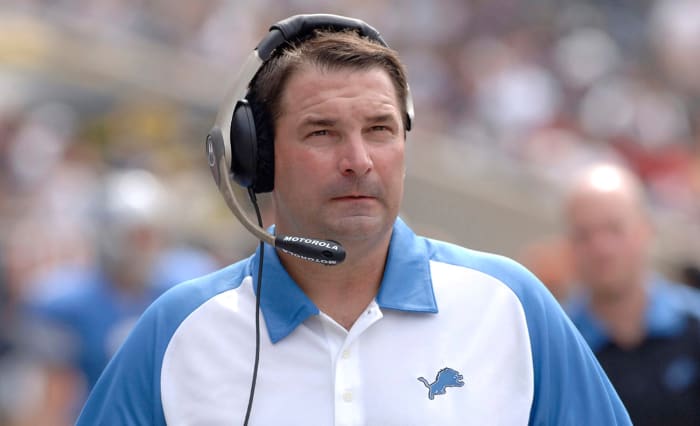
A suspension levied by the team meant that Cullen didn't make his NFL debut until the second game of the 2016 season.
Al Messerschmidt/Getty Images
By then Cullen was months into his counseling program and, per league protocol, had been in regular touch with a league representative. Meanwhile, he’d been coaching the hardest he’d ever coached.
“Marinelli said, ‘I don’t want you tippy-toeing around here on eggshells,’” says Cullen. “‘You’re gonna have to attack every day like it’s the last day you’re ever gonna coach.’”
It’s challenging for a coach with a suddenly marred reputation to own his position group’s meeting room. Cullen was fortunate to have a group of understanding players to work with.
“I decided I didn’t want to tease him because he’s a young coach and I’m a sensitive guy anyway,” says former Lions defensive end Tyoka Jackson, then a 12th-year veteran who is Cullen’s age. “I knew he was gonna get plenty of teasing. For me, I wanted to put my arm around the guy. Had he not gotten teased at all, I probably would have. That camaraderie is an important dynamic of the locker room.”
“It was a crazy situation so we didn’t want to go too hard,” says former defensive lineman Cory Redding, who still gushes about Cullen as a coach. “Although other guys weren’t in our position, they didn’t hesitate. They did their jokes and we laughed at them. We said a few things amongst ourselves but not much because, again, he was our coach.”
Everson Griffen Is On Their Minds
It helped that the humility Cullen brought to the meeting in New York showed up in his day-to-day work. “I had been playing in Marinelli’s system for 11 straight years, so I knew it like the back of my hand,” says Jackson. “Joe would ask me things. I thought that was big of him to be a coach in his first year on the job and be willing to ask me questions to learn the system and its nuances better.”
Cullen’s personal life was stabilizing too. During his second season in Detroit, he had gotten serious with a woman named Andrea. She was working on Wall Street, and she’d make the quick flight from New York to Detroit for Lions home games.
Despite the harmonious defensive line room, the Lions would win just three games in 2006. An encouraging 7-9 record in 2007 was all but forgotten a year later when, in 2008, the Lions became the first 0-16 team in league history. Marinelli and his staff were fired. Soon after, Cullen learned that despite his reputation as a bright young assistant, the time passed since his arrests and his good behavior since, he was still known as The Wendy’s Drive-Thru Guy.
“Nobody would touch him,” Marinelli recalls. “Nobody. College football, pro, nobody would touch him. It was such a hot item.”
Cullen was regarded as one of the better young defensive assistants in football; that reputation had been enough to save his job through the embarrassing arrests, but, he learned, not strong enough to get him a new one elsewhere. Jack Del Rio, the Jacksonville Jaguars’ head coach at the time, took a look but decided the team couldn’t afford the P.R. hit. Calls to others around the NFL proved futile; Cullen could feel the league’s annual game of coaching musical chairs winding down and he didn’t have a seat.
The silence of Cullen’s job search finally ended when his longtime friend and former UMass teammate, John Zamberlin, called. Zamerblin was the head coach at Idaho State University, a 1-11 team from the Division-IAA Big Sky Conference that played in a cold, dry, windy town of 54,000 called Pocatello. Or, “Poke-a-Hell-Hole,” as many Idahoans had come to call it.
Cullen asked if he needed to visit for a formal interview. “I said, ‘No, I know who you are and what you’re about,’” says Zamberlin, who got the university president’s approval on the hire. “Everybody makes mistakes.” And so Cullen packed his bags and moved to Pocatello. It would take Andrea three flights to get there, and so the couple put their relationship on hold. The ISU pay was so low that Cullen lived with Zamberlin, his wife, and their 9- and 7-year-old daughters. “He was great with my children and helping around the house,” says Zamberlin. “I was actually kind of sad the day he left.”
That day came less than a year after Cullen’s arrival. The Jaguars had a job opening again. Two of Cullen’s close friends worked for Jacksonville: Director of Player Personnel Terry McDonough (now No. 2 in the Cardinals front office) and linebackers coach Mark Duffner. Cullen sent Del Rio a letter expressing his continued interest. The Jaguars had also received a recommendation from Goodell.
With McDonough’s and Duffner’s imploring, Del Rio brought Cullen in for an interview. “You might be 15-20 minutes into an interview and you’re looking around, trying to figure out, ‘How can we close this down and move on?’” says Del Rio. “With Joe it was the opposite. Two hours later, we’re talking ball and he’s drawing on the board and we’re watching film and we’re talking through drills, it was just engaging. You could feel the passion, you understood the preparation.”
When Jaguars defensive coordinator Mel Tucker popped in and informed Cullen that they needed to get going if he was to catch his flight, Del Rio said, “What’s he need to get going for?” Cullen had the job.
Or, he almost had the job. Cullen’s hiring needed the approval of owner Wayne Weaver. Del Rio, Duffner, McDonough and GM Gene Smith marched to the owner’s office. Weaver picked up the phone right then and there and called Goodell.
Goodell remembers telling Weaver, “I’m not going to tell you whether he’s the best coach for you because that’s your determination, but as an individual, Joe has demonstrated incredible character and determination. He’s a guy who I think is worthy of a second chance. And I think he’s proven that.”
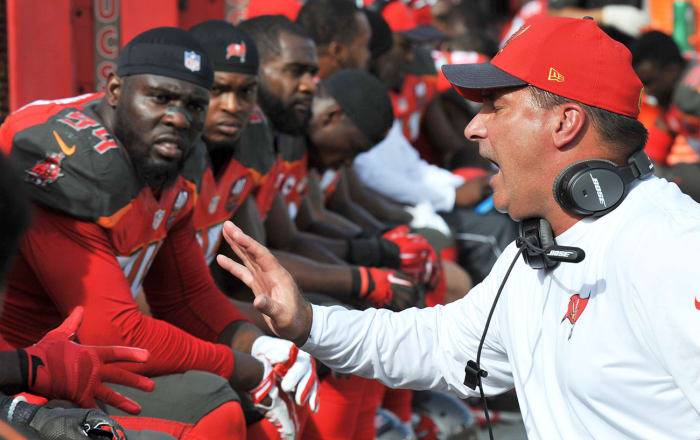
Cullen's work with the Bucs drew the attention of teams across the league, including the Ravens.
Al Messerschmidt/AP
The second chance had come, and Cullen made the most of it. He would spend the next three years in Jacksonville. He and Andrea renewed their relationship. In 2013 they married in Cleveland, where Cullen coached the Browns D-line under Rob Chudzinski. In 2014-15 he coached the Buccaneers D-line under Lovie Smith.
“When I first met him, he had already broken down all my college film,” says Bucs defensive tackle Gerald McCoy. “I had never even met him before and he had me completely broken down. And he did that for every D-lineman.”
Cullen has a raspy voice, which fades by the end of many practices, after hours of shouting.
“Joe Cullen is the only person who can have an individual drill and the whole field will stop working to watch it,” McCoy says. “I’ve never seen a coach that can demand attention from an entire football field because of his individual drill. You can hear him yelling from all the way on the other side. His intensity is nonstop.”
McCoy claims Bucs players never mentioned Cullen’s arrests. “A lot of them didn’t know about it.” The Ravens, who hired Cullen in 2016, echo the same thing.
“It was no concern because he’s proven himself many times over,” says head coach John Harbaugh. “We had to recruit Joe. It wasn’t like, ‘Oh I don’t know who to hire, Hmmm, Joe Cullen!’ It was like, ‘We gotta get this guy. I want him to be here.’”
That recruiting process has started to spill into bigger gigs. This past offseason Cullen, citing his desire to remain in the NFL, turned down a defensive coordinator job at a major college program. He also fielded calls from potential NFL head coaching candidates who were piecing together coaching staffs, looking for a coordinator.
“If you ever need somebody that can change a team’s mentality, or have the killer dog mentality, you have to hire Joe Cullen,” says McCoy.
“He coordinated some in college and he’s coached linebackers, so he really has a nice feel of the whole defense, secondary play, all of that,” says Marinelli. “One of his strengths is he’s really good on his feet in front of a group of men. And he’s a guy I think players will look up to. He’s very strong, very passionate.”
Says Goodell: “I’m really proud of him. He went through a difficult circumstance and has been absolutely committed to being a better man and doing things right. From my standpoint, that’s inspiring. And I think it inspires others.”
Cullen and Andrea have two daughters, ages 3 and 1. A third is on the way. It’s been 10 years since he was banished to the remote coaching outpost of Idaho State. It’s been 12 since his last drink. Joe Cullen’s comeback has been an unlikely one, and it seems it’s not over yet.
• Question or comment? Email us at talkback@themmqb.com.


































